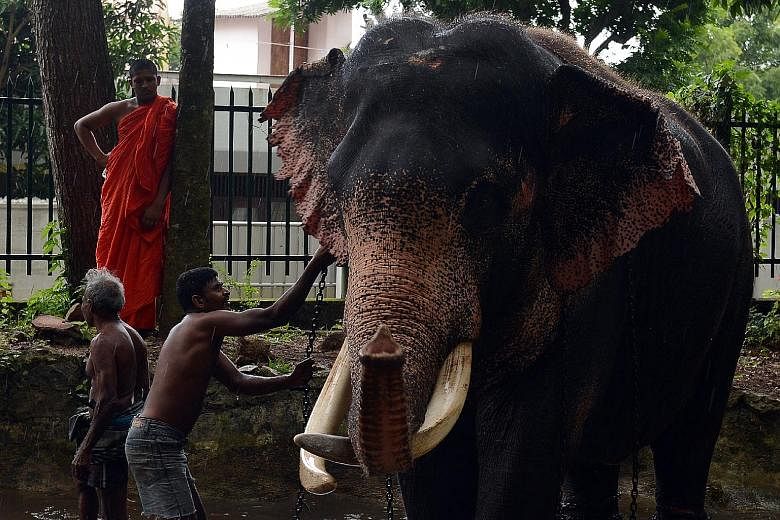COLOMBO • Expensive and high- maintenance, baby elephants have become the ultimate status symbol for Sri Lanka's wealthy elite - a trend that has horrified conservationists and prompted a government crackdown.
Elephants are venerated in mainly Buddhist Sri Lanka and capturing them is illegal. Yet, the authorities say more than 40 have been stolen from national parks over the last decade and are being kept as pets.
"The new rich wannabes want an elephant at home for prestige," said Asian elephant expert Jayantha Jayewardene, recalling an old Sri Lankan aristocratic tradition of keeping herds of the wild beasts. "This is for social climbing."
Earlier this year, the gift of a baby elephant to visiting New Zealand Prime Minister John Key sparked anger from animal rights activists who said it was cruel to separate it from its family, and the incident has not been repeated.
Worse, Mr Jayewardene says elephants are almost certainly dying due to the illegal trade. "The maternal instinct in elephants is very, very strong," he said. "Poachers can't get at a baby without the mother putting up a fight, and it usually ends with the death of the mother."
Guns are used to scare off the mothers and sometimes to kill them, he said. Elephant calves have also been known to be killed by the tranquilliser drugs used to make them more docile for capture.
Mr Pubudu Weerarathna, head of the Species Conservation Centre wildlife group, has been involved in a number of rescues and remembers one young calf succumbing to a tranquilliser overdose.
Intentionally killing an elephant is considered such a serious crime in Sri Lanka that it is punishable by death - though no one has been prosecuted for decades.
Two years ago, a group of activists reported catching rustlers red-handed with a baby elephant, but no action was taken.
In 2013, wildlife activists raised suspicions of a cover-up by some in the administration of former leader Mahinda Rajapakse after a registry of domesticated elephants disappeared. The document later reappeared with entries doctored. The case is being investigated by the police.
Rustlers are prepared to take such risks because of the huge sums involved - the Species Conservation Centre says baby elephants fetch as much as US$125,000 (S$168,000).
Some of the country's most powerful people have been implicated. Last month, judge Thilina Gamage was arrested following intense pressure from wildlife activists, who accused him of illegally keeping a baby elephant as a pet. He is now out on bail awaiting trial and has been suspended by the Judicial Service Commission.
That followed the arrest in March of Buddhist monk Uduwe Dhammaloka for keeping a two- year-old elephant at his temple in Colombo, though he says he was unaware he was acting illegally.
"I did not capture the elephant, it was left at my temple," he told the court during a preliminary hearing. "I treated it like any cat or dog people leave at temples when they can't afford to feed those pets." Now out on bail, Dhammaloka faces charges of stealing state property, which carries a possible jail sentence of three years.
Wildlife minister Gamini Jayawickrama Perera has told Parliament he is determined stop the illegal trade. The government has stopped the tradition of giving animals from its elephant orphanage in Pinnawala to Buddhist temples after activists raised concerns.
AGENCE FRANCE-PRESSE

